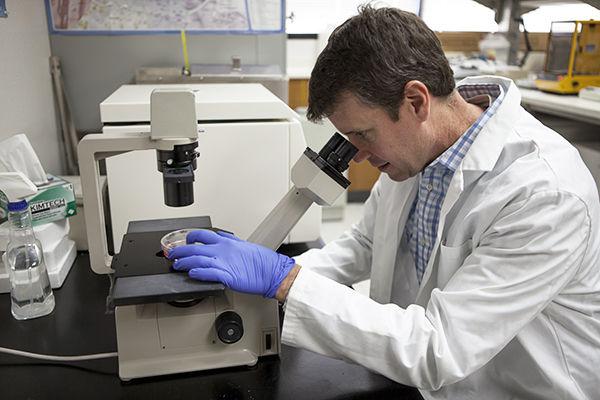Cancer research has evolved over the last 100 years, and Texas A&M researchers are attempting to make their mark in the field by targeting the root of the problem — cancerous stem cells.
Weston Porter, associate professor in the College of Veterinary Medicine and Biomedical Sciences, said he has recently collaborated with Clinton Allred, associate professor in the Department of Nutrition and Food Science, to study cancer cells and research breast cancer.
Porter said stem cells, which are cells capable of indefinitely creating more cells of the same type, only make up about 3 to 4 percent of cells in an organ. Porter said instead of chemotherapy, his and other recent research are focused on these stem cells in cancerous tumors.
“Since the 1970s, when we really started the war on cancer, our biggest endpoint for using chemotherapy is causing the tumor to shrink,” Porter said. “We’ve gotten really good at that. Almost every single chemotherapeutic agent we’ve developed will cause the tumor to shrink and go into regression. However, what we found was that those cancer stem cells were highly resistant to normal therapeutics. So they’re still there. What we’ve found is that we’re killing the wrong cells.”
Jeffrey Rosen, a distinguished service professor in the Baylor College of Medicine and research collaborator, said the reason behind this finding can be explained with the “dandelion hypothesis,” which compares cancer treatment to dandelions after a lawn cut. The mower destroys the flower, but the plant can return because the roots remain — a process similar to how current cancer treatments shrink the tumor, but fail to address the underlying causes.
Rosen said stem cells are dangerous because they may play a role in metastasis — the development of secondary malignant tumors throughout the body.
“It’s thought that these stem-like cells are the cells that are important for metastasis, which for solid cancers is what 90 percent of patients die from,” Rosen said. “They don’t die from permanent tumors, they die from the metastasis. [Cancer stem cells] are the cells that usually have the ability to invade and colonize in the lungs, or the bone, or the brain or other places, and so that’s really an area of major interest now, to understand how to treat metastasis.”
Porter said that along with this new research, the treatment of breast cancer has evolved, and many new therapies are on the way.
“There’s some great work being done looking at how nutrition plays a role, or looking at some chemoprevention — can we actually target those cancer stem cells earlier before the cancer actually becomes invasive or metastatic?” Porter said. “So that’s one of the hot topics right now in cancer research.”
While his new research is promising, Porter said the best way to combat cancer is early detection.
“In every single kind of cancer, it comes down to detection,” Porter said. “Most of the time you don’t detect the tumor until it is at least a centimeter or a couple of millimeters. The earlier you can detect it, the better.”
Porter said he is optimistic about the future of cancer treatment.
“We’re able to come up with treatments and keep people alive and treat it as it progresses, and if the disease changes we can change treatment at the same time,” Porter said. “So I think life expectancy is going to go up, quality of life is going to be going up. I don’t know if we’re actually going to cure it, but I think we’re going to get very good at managing it.”
The root of the problem
November 19, 2014

Photo by Vanessa Peña
Weston Porter, Texas A&M researcher and associate professor in the College of Veterinary Medicine and Biological Sciences, has received a grant to continue his research on cancerous stem cells.
Donate to The Battalion
Your donation will support the student journalists of Texas A&M University - College Station. Your contribution will allow us to purchase equipment and cover our annual website hosting costs.



















